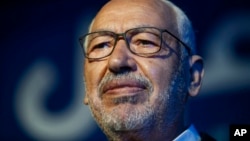Ghannouchi received a one-year prison sentence in May on terrorism-related charges. He was arrested in April after warning that eradicating different viewpoints such as the left or political Islam may lead to a "civil war."
His party responded by condemning the sentence, calling it an "unjust political verdict."
A statement released by the opposition party said Ghannouchi started his hunger strike "to defend the demand for the release of all political prisoners and to put an end to this injustice against them."
Imed Khemiri, Ennahdha's spokesperson explained the party's position.
Ghannouchi "decided to begin a three-day hunger strike to denounce the arbitrary and unfounded prosecution of the opposition," he said.
"It is also in support of the hunger strike started by Jawhar Ben Mbarek," he added, referring to the left-wing opposition figure and leading member of the National Salvation Front, FSN, opposition alliance.
Khemiri said political prisoners are forced to go on hunger strike in response to the "government's determination to dismiss opponents through baseless legal cases."
Ghannounchi is the most prominent of roughly two dozen opponents of Tunisian President Kais Saied that have been arrested since February, including former ministers and business figures.
Ben Mbarek, a critic of Tunisia's President Kais Saied that has been under arrest since February 24, has been on a hunger strike for four days to denounce his "unjust" detention, according to his sister, the lawyer Dalila Masaddek.
In July 2021, Saied dissolved Tunisia's parliament that was dominantly occupied by members of Ennahdha.
The North African leader has since ruled by decree in the only democracy to emerge from the Arab Spring uprisings that swept the region more than a decade ago.
In March, the European Parliament in a non-binding resolution condemned Tunisia’s "authoritarian drift" under Saied's leadership.

Forum